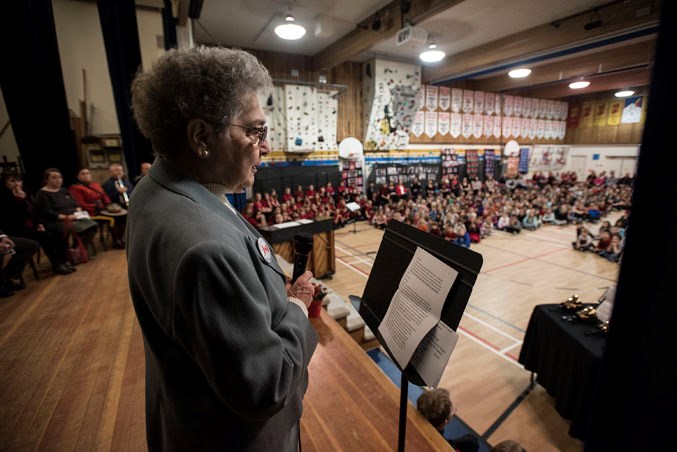Staff and students at Sir Alexander Mackenzie Elementary were joined by a very special guest as they gathered yesterday to commemorate Remembrance Day. Izola Mottershead, the great-niece of Alex Decoteau, attended to read the famed soldier’s last letter home to the assembly. In the letter, he thanks his sister for sending tobacco as he was broke and didn’t have any. “Can you imagine a man smoking and becoming an Olympic runner?” she asked rhetorically, to the audience’s bemusement. Decoteau held a number of long-distance records in Western Canada and represented the country in the 5,000-metre event at the 1912 Summer Olympics Olympics in Stockholm. While leg cramps hindered his overall performance there, his ability to “hoof it” was legendary and served him well in his other careers. The young Cree man from the Red Pheasant First Nation was the country’s first Indigenous police officer when he joined the Edmonton Police in 1911. A few years later, his desire to serve led him to sign up for the Canadian Expeditionary Force during the First World War. He fought with the 49th Battalion, demonstrating his physical prowess as a communications trench runner. He died during the Second Battle of Passchendaele, shot by a German sniper. More than 4,000 Canadian soldiers were killed and nearly 12,000 wounded, along with 275,000 British and 220,000 German casualties during the brutal conflict. On the occasion of the 100th anniversary since the victory of that critical campaign to secure ridges around Ypres, Mottershead spoke fondly of the uncle she never met but whose image is still burned in her thoughts, whose legacy lives on in her heart. “It’s very important to me. I try to emphasize the children. That’s where our history is planted in them, so that they know what has gone before. They have somebody to look up to with Alex Decoteau, particularly Indigenous people,” she said beforehand. Recently, she was invited to speak at the Parliament buildings. The occasion left her reflecting on how conflicts can be resolved between disparate groups. “I’m getting so that I don’t know what to say because almost everybody knows about Alex Decoteau. They know who he was, what he did … all the facets of his short life. When we opened the park [named in his honour] downtown, I went the night before to smudge the area. There were dogs running in the off-leash park. I watched them for a long time. There were mixed breeds. There wasn’t one harsh word spoken among them,” she laughed. She shared that story with the House of Commons, hoping to inspire a renewed sense of commonality between all of Canada’s ethnic communities. “I spoke about the getting together of those dogs. If the dogs can do it, why the heck can’t we? That’s what that park was about.” While Decoteau was later inducted into the local, provincial and national sports halls of fame, also honoured with that park and a new neighbourhood in Edmonton, Mottershead wrote a book about him to preserve his now century-old accomplishments for more than posterity. She said it was important to set everything straight. More than anything, her great-uncle was motivated to serve his country. “I think there were two things: patriotism, and he had a girlfriend here, a white girl. He would have married her, he loved her, but her parents wouldn’t hear of her marrying an Indian boy. I think he felt that maybe if he went off to war and became a hero, they might think differently of him.”




